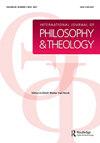主权者存在吗?罗伯特·穆希尔的政治神学
IF 0.3
0 PHILOSOPHY
International Journal of Philosophy and Theology
Pub Date : 2022-05-27
DOI:10.1080/21692327.2022.2127420
引用次数: 0
摘要
本文讨论了对罗伯特·穆希尔《没有品质的人》中论点的一种可能的政治神学解释。正如卡尔·施密特(Carl Schmitt)所指出的那样,穆希尔(或他笔下的人物)对上帝与政治君主之间任何真正类比的可能性提出了根本性的挑战。这关系到奥地利作为一个尚未诞生的现代君主的地位。然而,这部小说展示了为什么试图把它想象成上帝的形象都失败了。在考察了四种这样的尝试之后,主要的焦点将是在这种世俗背景下讨论坎特伯雷的安瑟伦的存在主义论点。受到狄奥蒂玛启发的是冯·博尔德韦尔将军,一个几乎被忽视的人物,他做出了最严肃的尝试,认为政治主权是可以想象到的最伟大的东西。他们的论点是,伟大需要包含每一种思想及其对立面,这就产生了秩序的概念。但秩序意味着一切的终结。因此,我们面对的不是一个永生的上帝,而是一个以死亡为标志的政治主权。本文章由计算机程序翻译,如有差异,请以英文原文为准。
Does the sovereign exist? Robert Musil’s political theology
ABSTRACT The paper discusses a possible political theological interpretation of arguments developed in Robert Musil’s The Man Without Qualities. What emerges is that Musil (or his characters) pose a fundamental challenge to the possibility of any real analogy between God and the political sovereign, as suggested by Carl Schmitt. At stake is Austria as a yet-to-be-born modern sovereign. However, the novel shows why attempts to conceive it in an image of God all fail. After surveying four such attempts, the main focus will be the discussion of Anselm of Canterbury’s existential argument in this secular context. At Diotima’s inspiration it is General von Bordwehr, a largely neglected figure, who makes the most serious attempt to argue for the political sovereign as the greatest conceivable thing. The argument is that greatness entails containing every idea and its opposite, and this yields the concept of order. But order means the frozen end of everything. Hence, instead of a living God, we end up with a political sovereign marked by death.
求助全文
通过发布文献求助,成功后即可免费获取论文全文。
去求助
来源期刊

International Journal of Philosophy and Theology
PHILOSOPHY-
CiteScore
0.30
自引率
0.00%
发文量
12
期刊介绍:
International Journal of Philosophy and Theology publishes scholarly articles and reviews that concern the intersection between philosophy and theology. It aims to stimulate the creative discussion between various traditions, for example the analytical and the continental traditions. Articles should exhibit high-level scholarship but should be readable for those coming from other philosophical traditions. Fields of interest are: philosophy, especially philosophy of religion, metaphysics, and philosophical ethics, and systematic theology, for example fundamental theology, dogmatic and moral theology. Contributions focusing on the history of these disciplines are also welcome, especially when they are relevant to contemporary discussions.
 求助内容:
求助内容: 应助结果提醒方式:
应助结果提醒方式:


